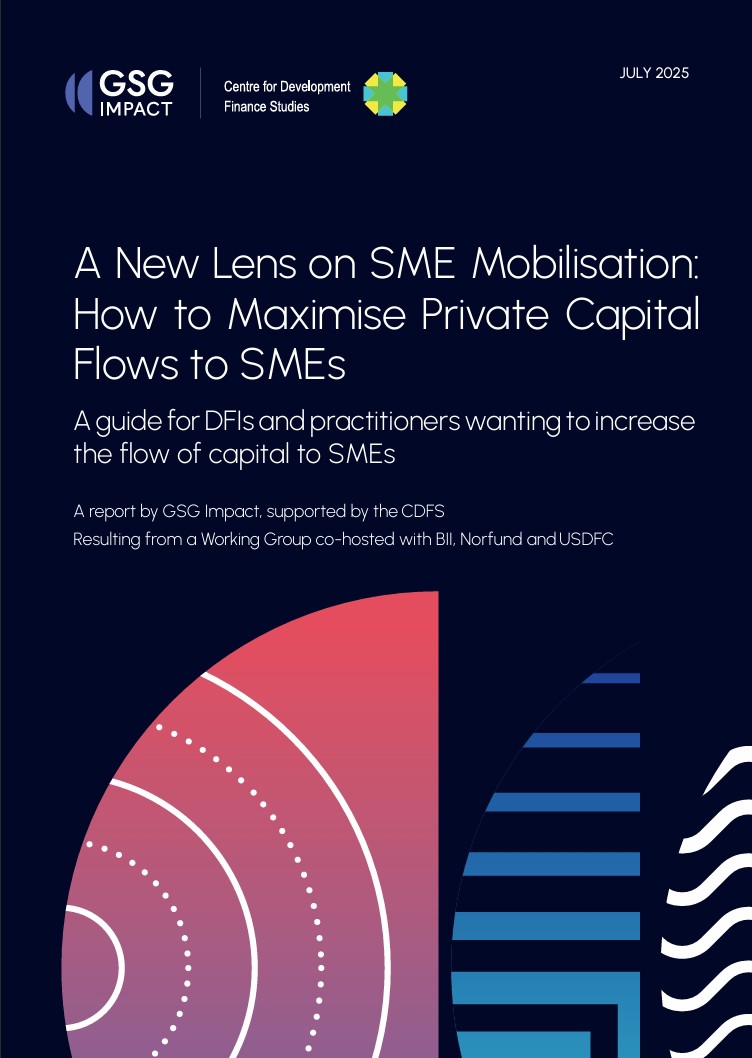
Development Finance Institutions (DFIs), including bilateral DFIs, multilateral development banks (MDBs), and public development banks (PDBs), are critical enablers of SME finance in emerging markets and developing economies (EMDEs), channeling capital and capacity through local intermediaries to unlock sustainable economic development.
75% of DFI commitments to SMEs are intermediated through domestic commercial banks and local or regional SME funds.
These intermediaries then on-lend, invest, or provide non-financial support to SMEs. However, investments by DFIs can never meet the annual $5T USD SME funding shortfall on their own, given that their total annual commitments are around $140B USD, and only a fraction of that targets SMEs. This is why the role of DFIs acting as catalysts, mobilising domestic and international private capital, is increasingly seen as a primary objective by the development finance community.
Our Working Group set out to describe how DFIs are mobilising private capital for the benefit of SMEs through the analysis of data provided by the three DFIs co-hosting the Working Group (British International Investment, Norfund, and the United States International Development Finance Corporation (DFC)), alongside 13 case studies based on interviews.
As definitions of capital mobilisation evolve, new approaches like the IFC’s work on Private Capital Enabled (PCE) mobilisation aim to capture broader systemic effects. BII has also highlighted ten pathways through which DFIs mobilise commercial capital.
A clearer understanding of indirect mobilisation can help target and scale private investment into SMEs more effectively.
Download the Executive Summary of the report.
Key findings:
This study reveals that private capital mobilisation for SMEs by DFIs is not happening in the way that it is usually accounted for and measured: instead, low mobilisation levels are reported at the point of investment.

Substantial private capital is being mobilised downstream, through banks and funds supported by DFIs
The report introduces a new concept, “secondary mobilisation”, and offers a practical roadmap by which to recognise, track, and scale this phenomenon.

“Secondary mobilisation”
It refers to private capital that is catalysed downstream from DFI investments at the intermediary or end-SME level thanks to DFIs’ support, but not directly co-invested alongside the DFI. This additional finance, predominantly domestic and commercial, supports SMEs yet goes largely unmeasured under existing OECD or MDB frameworks. For example:
- A bank receives long-term DFI funding, technical assistance, or guarantees to develop SME lending capabilities and then deploys its own balance sheet capital (through, for example, local currency deposits) to scale SME loans, which will surpass the amount of the initial DFI investment.
- An SME fund supports its portfolio companies in raising additional local private capital, which is neither counted nor systematically tracked by DFIs.
“Secondary mobilisation” is already happening and replicable.
Our analysis of 13 case studies of financial intermediaries in emerging markets shows that when certain success factors align, such as strong management buy-in by the intermediary, targeted technical assistance, and supportive DFI engagement, significant local capital is mobilised. These factors are not new, but what is new is recognising their combined effect in driving downstream mobilisation beyond the initial DFI investment. This “secondary mobilisation” is largely unmeasured but critical for scaling SME finance.
In this paper, we present a provisional framework for thinking more holistically about capital mobilisation through financial intermediaries DFIs use to reach SMEs. We explore how successful models of secondary mobilisation can be scaled to achieve broader impact.
About the Report
In June 2024, GSG Impact launched a Working Group co-hosted with three Development Finance Institutions (DFIs) British International Investment (BII), Norfund, and the United States International Development Finance Corporation (DFC). The goal of this initiative was to assess DFI success factors to mobilise private capital for the benefit of small and medium-sized enterprises (SMEs) in emerging markets and developing economies (EMDEs).
The project aimed to ensure that DFIs and PDBs have a better understanding of what actions they can take to mobilise additional sources of private capital, especially to benefit SMEs.
The initiative was set up to create an evidence-based framework to select and analyse cases of successful capital mobilisation, with demonstrated improvements for SME finance in EMDEs and generate a list of success factors and actionable recommendations that can be implemented by DFIs, PDBs, and other players to increase capital flows to the SMEs in EMDEs.
The project has been carried out by GSG Impact and supported by the Center for Development Finance Studies. An Advisory Group composed of the co-hosting DFIs and selected experts has provided strategic guidance throughout the project. Support from the three Development Finance Institutions (DFIs) co-hosting this initiative, British International Investment (BII), Norfund, and the United States International Development Finance Corporation (DFC), was invaluable in defining and contextualising DFI approaches to funding SMEs and measuring mobilisation.
We are also thankful for the funding received from Argidius Foundation, a member of the Growth Firms Alliance, FCDO, and the Government of Japan, which made this work possible, and for the contributions of the 60 Working Group members (DFIs, PDBs, GSG National Partners, and other key stakeholders).
No Content Set
Exception:
Website.Models.ViewModels.Components.General.Authors.AuthorComponentVm












